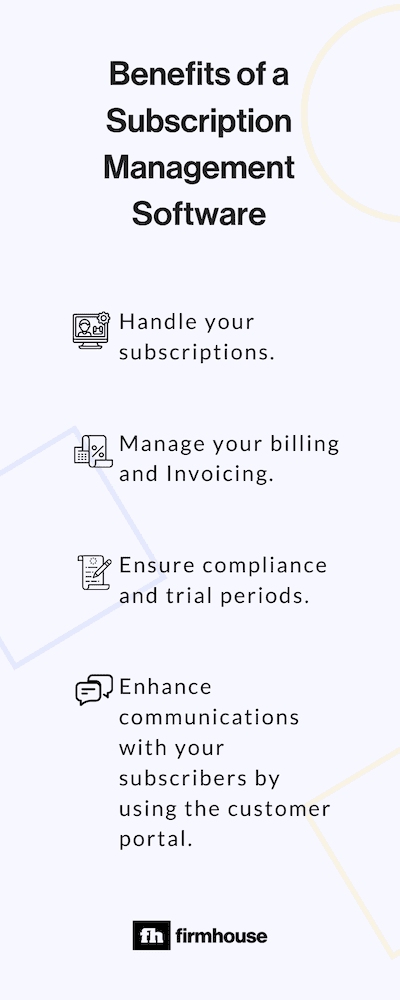Sep 1, 2020
What is Recurring Billing and Subscription Management Software?
Recurring billing and Subscription Management are crucial for your customer relationship. Learn how your subscription business can benefit from them.
Cristina Quijano
Marketing
Recurring billing and Subscription Management software play a crucial aspect in your customer relationship. Recurring billing ensures that your subscribers get to know what they are paying for, when they have to pay, the exact amount, and all billing information necessary, so there's transparency from the beginning. Meanwhile, Subscription Management Software has a complete overview of your subscription business.
In this blog, we will explain to you:
What recurring billing and subscription management software are.
The difference between subscription billing and subscription management software.
Some of the benefits of having a subscription billing and a subscription management software on your subscription business.

What is Recurring Billing?
Subscription billing is a process of billing subscribers on a recurring basis. It also involves your pricing model, billing cycles, and automation of invoices and payment collection.
Recurring billing comes in handy for your subscription business to:
Identify how many subscribers need to get billed in each period.
Which products are selling more.
How to collect payments from subscribers.
When your subscribers need to get billed.
Subscribers data and analytics.
It allows you to have flexible billing with customized invoices.
What does a Recurring Billing software do?
Recurring billing software facilitates the billing process for you, allowing you to collect payments from subscribers from different payment gateways such as; credit and debit cards, stripe, mollie, wire transfer, etc.
What is subscription management?
Subscription management is the process of managing your subscribers' life cycle from start to finish. A subscription management system stores your product(s) catalog, subscribers, billing cycles, pricing trials, and more across their subscription lifecycle.
What is the difference between recurring billing and subscription management?
If you are operating a subscription business, recurring billing isn't the only thing you should concern.
To establish a successful subscription business, you need to strike to have a balance between billing and your subscription management. Let's take a look at some of the differences between both.
Recurring billing and subscription management software go hand in hand. Recurring billing has more consequences across your revenue operations and recognizing your revenue for your subscription business. In contrast, subscription management deals with your existing customers and the process of ensuring that they stay up to date with your subscription business.
Recurring billing deals with processing new subscribers, which means it handles the moment when a prospect becomes a customer. Additionally, subscription billing works on top of the payment gateways, so you don't have to worry about this.
Subscription management and recurring billing software can be connected to your subscription business, so you don't have to worry about developing or maintaining it; you just need to integrate it with your e-commerce platform.
Moving to a subscription management software can help your subscription business to:
Handle your subscriptions (subscribers, pricing models).
Billing (taxes, schedule, payments, discounts).
Invoicing (who to invoice, and which format to use).
Ensure compliance and trial periods.
Enhance communications with your subscribers by using the customer portal.

Recurring billing is tied to your pricing model, so you want your recurring billing to adapt as your pricing and subscribers evolve.
Once your subscription business starts growing and scaling on subscribers, the more complexity you'll have. Every additional subscriber, pricing change, and upgrades and downgrades will also change.
You can decide to build your own recurring billing system; however, you'll have to build it from scratch, develop the system, provide support, and maintain it. If you decide to buy a subscription billing software, you can integrate a complete billing system with no hassle and provide your subscribers' the best customer experience.
What are the features you want to look for in a Subscription Management system?:
Manage your subscribers' lifecycle management
Support pricing model/plans
Build checkout pages
Establish payment gateways
Define and set your trial management
Have dunning management in place
Provide a customer self-service portal
Manage your taxation and invoicing
Your subscription management and recurring billing system should help you to provide a greater customer experience.
With a billing system, you are not locked in with just a payment method, but instead, you can be flexible and offer your subscribers different payment methods.
Suppose you are growing in subscribers, and you need to expand to different markets. In that case, the correct billing system will help your subscription business offer and adapt your business to the different payment methods offered in each country.
When a customer subscribes to your product, they agree to automatically get a deduction from their account on a recurring basis.
Checklist when choosing a subscription management software:
Does it let you manage your subscribers' life cycles?
Is it possible to visualize your products, subscribers, and payments?
Does it support your subscription pricing models?
Can you connect it easily with your e-commerce platform?
Can you track customer upgrades, downgrades, or changes?
Which subscription businesses benefit the most from recurring billing and subscription management?
Any subscription business that offers products that need to be paid on a recurring basis can benefit from using a recurring billing and a subscription management software.
Types of Recurring Billing:
Fixed
Variable
Fixed
Fixed billing considers that the same amount of money will be collected from your subscribers in each payment cycle. Having a fixed billing means having a stable revenue for your subscription business, and it provides scalability over time.
Variable
In a variable billing, the amount collected from subscribers might change in each payment cycle depending on some aspects like the usage or the product, so you'll need a dynamic bill in each cycle.
The type of recurring billing you need to use depends on your business. If you are selling subscriptions that aren't based on usage, you need to use a fixed billing, while if you have a usage-based subscription such as (washing machines), you need to have a variable billing in place.
Benefits of a recurring billing software:
The benefits of using a billing system in your subscription business have a direct impact on your subscribers and on your business. With a billing software, you'll have less hassle handling your subscription cycles and your subscriber management.
These are 4 benefits of recurring billing:
Convenience for customers
Start saving time
Avoid delayed payments
Have predictable revenue
1. Convenience for customers
When customers sign up, they agree to pay each cycle automatically. Automated subscription billing eliminates much of the administrative work that goes along with collecting payments and managing subscribers. These reductions can help you set prices that are more accessible for your customers.
2. Start saving time
Suppose you have a subscription billing system working in place. In that case, you'll be saving so much time as the customer only needs to sign up and provide their payment information with you. Once they agree to the payment, the amount can be deducted automatically for receiving (or using) your products regularly.
When automating your billing system, you also have your invoice created right way, the payment cycle set, and your subscriber knows upfront how much they will be billed and charged.
3. Avoid delayed payments
You can also prevent delayed payments. By avoiding any delayed payments, you can save time from unnecessary follow-ups. Instead, you can focus on other aspects of your subscription business and have the tranquility of having a system in place for your payment collection.
4. Have predictable revenue
Recurring billing provides consistent and reliable cash flow for your subscription business. This helps to predict the revenue that will be generated in a given time.
Additionally, a subscription billing solution allows you to have accurate forecasts of how much revenue your business will bring in a period of time. If you have a system to track and monitor your revenue, you can make more adequate decisions to grow your subscription business.
Now we've seen how recurring billing can benefit both your customers and your subscription business.
Subscription billing software helps you to automate your subscribers' payments and billing cycles. It also allows you to have different payment gateways so you can be flexible and provide the best experience to subscribers.
Your subscription management software has a complete overview of your subscribers' lifecycles and a comprehensive overview of your products and subscribers.
In Firmhouse, we help you set your subscription management and get started with your subscription business with no hassle. Contact us to schedule a demo or create your free account today.





